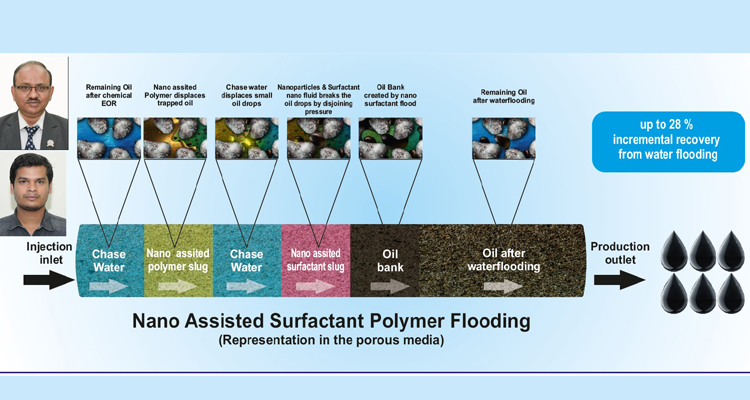by Ashis Sinha
 IIT (ISM) Researchers found that by using Nanoparticles oil recovery from reservoirs can be enhanced by 7 per cent.
IIT (ISM) Researchers found that by using Nanoparticles oil recovery from reservoirs can be enhanced by 7 per cent.
A team of researchers of the Petroleum Engineering Department of Dhanbad-based premiere technical cradle, IIT (ISM) has conducted research that can ensure enhanced recovery of oil lying trapped in the pores of rock using Nanoparticles.
The findings of research conducted at a cost of Rs 39 lakh funded by the Institute of Reservoir Studies (IRS), ONGC Ahmedabad by the three-member team of IIT (ISM) led by Ajay Kumar Mandal, Head of the Department of Petroleum Engineering and assisted by Neetish Kumar Maurya, assistant professor and Dinesh Modi, Junior Research Fellow (JRF) during 2019-21 revealed that use of Nanoparticles can increase oil recovery up to the tune of 7% or more.
Divulging details about the research, Dr Ajay Kumar Mandal, said, “Only around 20-30% of oil can be recovered easily from the reservoir while the recovery of remaining 70-80% trapped oil requires additional impetus in the form of water, chemical injection or thermal methods.
“Oil stuck up in the pores of rocks turns immobile- thus the usage of Nanoparticles which can travel deep into the rocks enhances recovery of such stuck up oil by mobilizing the oil droplets into the production well” further explained Dr Mandal and added that the research team visited the IRS ONGC Ahmedabad thrice during the course of research to collect information and also to collect crude oil, formation water and rock samples.
Divulging more details about the step-by-step progress of the research, Dr Mandal said, In the first step experimental investigation to screen suitable nanoparticle for enhanced oil recovery (EOR) was carried out during which its interaction with crude oil, formation water and rock surfaces were carried out.
“The team found that silica nanoparticle Nanofluid is stable at oil reservoir condition as it provides favourable interaction with reservoir rock and fluid for Enhanced Oil Recovery”, added Dr Mandal.
“In the second step, we designed the chemical slug to be injected in the oil reservoir as nanoparticles can be injected in the oil reservoir alone or in synergy with surfactant and other chemicals. The chemical slugs were then tested for wettability improvement, Interfacial tension reduction and other Enhanced Oil Recovery design criteria “further explained DrMandal.
“In the final step, actual potential of incremental oil recovery was established by injecting these chemical slugs in core flooding experiment,” said Assistant professor Neetish Kumar Maurya and added that Small rock samples, representative of reservoir rocks, were placed in core holders.
“Outcome of this research established that we can further improve the efficiency of the chemical injection process in oilfields by using nanomaterial for enhanced oil recovery,” said Maurya.
Regarding the cost-effectiveness of new process of enhanced oil recovery using nanoparticles Maurya said, “We did not perform a cost analysis and only feasibility study was carried out as this technology is still in a nascent stage, however, many researches are working to produce nanomaterial from alternative sources to make the production cheaper and efficient”.



